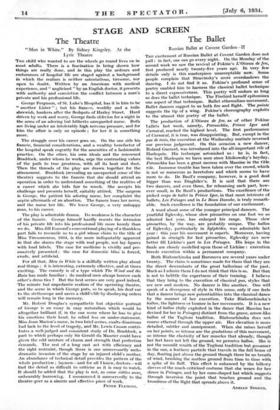STAGE AND SCREEN
The Theatre THE child who wanted to see the wheels go round lives on in most adults. There is a fascination in being shown how things are really done, and in this play the ardours and endurances of hospital life are staged against a background in which the realism is neither ostentatious, tiresome, nor open to doubt. Written by an American with medical experience, and " anglicized " by an English doctor, it presents with authority and conviction the conflict between a man's
private and his professional life. - George Ferguson, of St. Luke's Hospital, has it in him to be " another Lister " ; but his fiancee, worldly and a trifle shrewish, hankers after the fleshpots of Harley Street. Hard driven by work and worry, George finds oblivion for a night in the arms of an adoring but hitherto unregarded nurse. Both are living under an intolerably high nervous pressure, and for him the affair is only an episode ; for her it is something more.
The struggle over his career goes on. On the one side his fiancee, financial considerations, and a wealthy benefactor of the hospital speak cogently for the amenities of a fashionable practice. On the other, his own ideals and the renowned Braddock, under whom he works, urge the contrasting values of the path to true greatness, with all its heat and dust. Then the threads of the play are drawn together for the denouement. Braddock (revealing an unexpected sense of the theatre) suggests to the fiancee that she should attend an operation in order to understand something of the realities of a career which she bids fair to wreck. She accepts his challenge and presents herself, suitably attired. The surgeon is George, the patient his adoring nurse, her complaint the septic afterinath of an abortion. The fiancee loses her nerve, and the nurse her life. We leave George, a very unhappy man, to his career.
The play is admirable drama. Its weakness is the character of the fiancee. George himself hardly resents the intrusion of his private life into his professional life more keenly than we do. Miss Jill Esmond's conventional playing of a thankless part fails to reconcile us to a girl whose claim to the title of Miss Tiresomeness, 1934, is the more indisputably apparent in that she shares the stage with real people, not lay figures with loud labels. The case for medicine is vividly and per- suasively presented ; the case for domestic bliss is forced, crude, and artificial.
For all that, Men in White is a skilfully written play about real things ; it is interesting, extremely effective, and at times exciting. The comedy is of a type which The Wind and the Rain has made familiar ; do medical men always borrow each other's dress ties ? But the best scenes are very good indeed. The minute but unpedantic realism of the operating theatre, and the scene in which George puts, so to speak, his deaf ear to the, stethoscope and saves a child's life by disobeying orders will remain long in the memory.
Mr. Robert Douglas's sympathetic but objective portrait of George is an essay in easy naturalism which would be altogether brilliant if, in the one scene where he has to give his emotions their head, he relied less on under-statement. , Miss Joan Marion's nurse, in two brief scenes, exalts disastrous bad luck to the level of tragedy, and Mr. Lewis Casson contri- , butes a well-judged and consistent study of Dr. Braddock, a part to which perhaps only Sir Gerald du Maurier could have given the odd mixture of charm and strength that perfection . demands. The rest of a long cast act with efficiency and the right restraint, though there is one unnecessarily melo- dramatic invasion of the stage by an injured child's mother. An abundance of technical detail provides the pattern of the whole production ; laymen—and for all I know, doctors—will find the detail as difficult to criticise as it is easy to watch. It should be added that the play is not, as some critics aver, unbearably harrowing. I recommend it unreservedly to the theatre-goer as a sincere and effective piece of work.
PETER FLEMING.










































 Previous page
Previous page